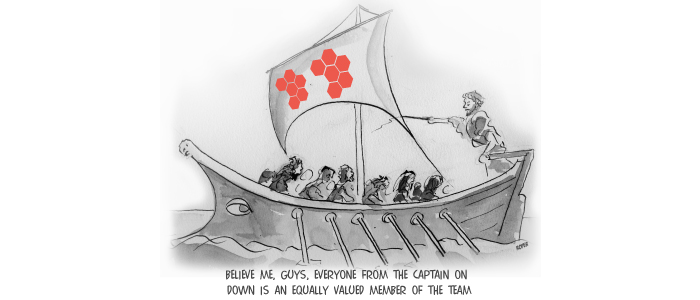It’s easy to spot a really dysfunctional team in an organisation. People are political, don’t support each other, are confrontational, divisive and they don’t actually do what they say they’re going to do. At Leaders Lab we rarely have to deal with a senior team in this state (although we are occasionally asked to get involved as a last resort). In such cases, the team is not just going through a ‘storming’ phase. (This is the part of the natural cycle before the team moves through to ‘performing’ under competent leadership). This will be a team that has, over time, swept so much under the carpet that it’s now impossible to even walk on the carpet.
It is far more likely that we will be asked to do some team building with a team that is working quite well together, but has issues that in time could undermine their performance. There are quite obviously cracks in some of the relationships, conversations that need to be had that people are avoiding, faint resentment building up and a lack of really good professional communication skills.
So I was intrigued (and quite impressed) by a CEO recently who is forward thinking enough to talk to me about ‘stress testing’ the Board. There is no question that they are ‘good’ but she wants them to be ‘great’. More importantly, she wants them to be ‘match fit’ for when a really big challenge comes along, as it inevitably will, in the next two years or so. At the moment it’s difficult to even articulate what the issues are, but there are definitely hairline cracks and it’s a very strategic leader who tackles them early on.
Where do you start if you want to address the cracks in your team? Team meetings are probably as good a place as any. This is where the behaviours and difficult relationships tend to show up.
At Leaders Lab we have a set of simple Groundrules for meetings. Although some of them may seem obvious they offer real insight into the culture of an organisation. Do people automatically turn off their phones in team meetings in your organisation? You’d be amazed how that’s not necessarily the case. Just allowing team members to ignore that simple groundrule seriously undermines not only the quality of that meeting but also the dynamics of the team. What is this person insinuating? I am not turning off my phone because I am too important/busy/bored/disengaged/resentful/not able to contribute anything because I shouldn’t be here (maybe they shouldn’t?).
Here is the full list of Groundrules:
- Be present – ready, on time, mind clear, fully prepared
- Focus – no distractions – clear your diary, don’t do work during the meeting
- Speak up – tell it like it is – warn if you think what you say will be challenging or ‘risky’
- Make requests and suggestions, don’t complain
- Keep your word. If you say you’ll do something, do it
- Speak for yourself – use ‘I’
- Listen and hear each other out – no interrupting, one person speaks at a time
- Get to the point – make your point concisely, with respect
- Confidentiality – other people and their issues not to be talked about outside the meeting
- Decision-making by alignment
- Park issues as they arise, to keep on track
- Start and finish on time
How many of these can you honestly say typify your meetings and the culture of your organisation?
Tried this? Found it harder to implement than you expected? Give us a call for a no-obligation conversation and some free advice. Call us on 01865 881056.
